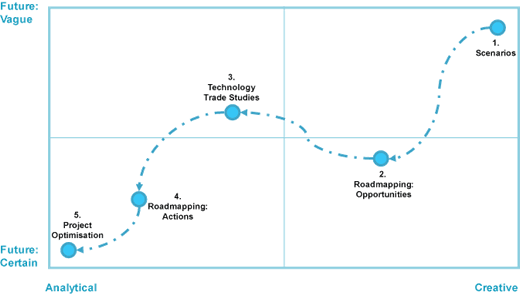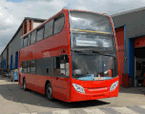
MSSL Website
|
 |
TECHNOLOGY MANAGEMENT GROUP RESEARCH
The Technology Management Group has a broad range of interests in the areas of technology, systems engineering and risk management and actively explores these through research and consultancy projects.
Consultancy focuses directly on the needs of the customer, and can last from a day up to several months. Research projects tend to be longer, typically 1-3 years in duration, and include an element of academic interest.
Specific areas of interest are:
Technology Planning
We have developed a process to manage the full range of activities required to plan the introduction of a new technology.

Starting with a strategic appraisal of the future state of the world the technology is expected to operate in through scenario planning, we next create a roadmap of the opportunities available. The potential technology options are compared through trade studies, before revisiting the roadmap with a view to implementing the technologies preferred in the trade studies. The final stage is to optimise the project that delivers the technology by considering the most appropriate resource profile given the risk of the project and other factors.
This approach was developed in a three-year research project sponsored by EPSRC, the DTI, GlaxoSmithKline, and Syngenta, which analysed the instrumentation supply chain.
Consultancy projects in this area have been performed with GlaxoSmithKline and the Photonics Knowledge Transfer Network.
The research on this was awarded the prize for the most novel use of systems engineering in the 2006 European Systems Engineering Conference.
|


|


|
Systems Thinking
A systems view of the world can be applied to good effect in most projects.
We have recently applied one systems thinking technique (‘soft systems methodology’) to help an aerospace prime contractor to learn more from its experience in previous projects.
We applied another technique (‘system dynamics’) to think about the implications of introducing a variable charge for household waste collection on the incidence of fly-tipping.
This is an example of a joint project we have carrierd out with UCL's Jill Dando Institute of Crime Science - applying systems techniques to understand the causes of crime. |
|
|
Managing Complex Projects
Most people realise that complex projects have a tendency to go wrong. What most people don’t realise is that these failures are quite easy to predict.
Drawing on experience from managing over 35 satellite missions and over 200 rocket experiements (with no failed missions), and many other successful non-space projects (such as 'Smart X-ray Optics'), the Technology Management Group has great interest in the theory and practice of managing complex projects.
We have written guidance for the UK Research Councils on best practice for managing complex projects.
In particular, we research issues associated with the management of technological risks in projects, and provide training for BP worldwide on Technology Risk Management. |
|
 |
|
Systems Modelling
We are experts in systems modelling, and are working with BAE Systems and Alexander Dennis buses on a £4m project to develop hybrid electric/diesel/fuel cell technology for passenger transit buses. The project - called Hybrid Electric Technology for Transit Buses - will last three years, and is being funded by the Government's Technology Strategy Board and the Department for Transport.
Our role is to develop a model to optimise the energy storage and power management throughout the vehicle, and to predict the challenges of integrating the technology into the existing system. |

|
|
Research Students
In addition to the interests of our research staff, we are supervising over 30 research projects that are being conducted by our MSc students.
This page last modified
15 July, 2009
by Michael Emes
|
 |

|








